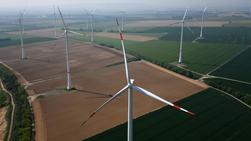 This aerial view shows wind turbines of German energy giant RWE near Bedburg, western Germany, on May 8, 2020. (PHOTO / AFP)
This aerial view shows wind turbines of German energy giant RWE near Bedburg, western Germany, on May 8, 2020. (PHOTO / AFP)
LONDON — Global growth in new renewable energy capacity will experience its first annual decline in 20 years this year amid the coronavirus pandemic but is expected to pick up next year, the International Energy Agency said on Wednesday.
The world is set to build fewer wind turbines, solar plants and other installations that produce renewable electricity this year as energy demand has been reduced across commercial and industrial sectors and logistics issues delay projects.
“Countries are continuing to build new wind turbines and solar plants, but at a much slower pace,” IEA executive director Fatih Birol said.
Countries are continuing to build new wind turbines and solar plants, but at a much slower pace
Fatih Birol, Executive director, International Energy Agency
ALSO READ: Increase investment in energy innovation
“Even before the COVID-19 pandemic struck, the world needed to significantly accelerate the deployment of renewables to have a chance of meeting its energy and climate goals.”
Renewable capacity additions this year are set to total 167 gigawatts (GW), 13 percent less than last year, according to the IEA’s Renewable Market Update report.
But overall global renewable power capacity is still expanding and will grow by 6 percent in 2020.
Slower growth this year reflects delays in construction activity due to supply chain disruptions, lockdown measures and social distancing as well as financing challenges.
READ MORE: Nation switches on to renewable energy
Next year, renewable power additions are forecast to rebound to the level reached in 2019, as delayed projects come online and assuming a continuation of supportive government policies.
Growth for 2020 and 2021 combined is expected to be 10 percent lower than the IEA had previously forecast before the coronavirus outbreak.
Almost all mature markets are affected by downward revisions, except the United States where investors are rushing to finish projects before tax credits expire.


